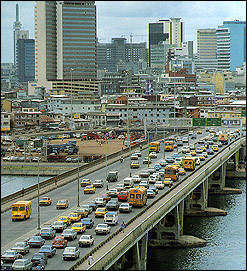 Incentives for Investment in Nigeria Incentives for Investment in Nigeria |
Nigeria's country risk rating is bound to register a favourable change as the government's confidence-building measures continue to elicit the approval of the global business community. Judged on the scale of the Bretton woods institutions, newly democratic Nigeria has not put a wrong foot forward-yet! The government has no wish to squander the country's hard-won stock of global goodwill. It is evident that the country will readily bend over backward to accommodate the genuine investor.

As far back as 1995, Nigeria had abrogated two legislations considered to be hindrances to attracting foreign investment. These were the exchange control act of 1962 and the Nigerian enterprises promotion decree of 1972. In their place was enacted the Nigerian investment promotion commission decree which eliminates all barriers to foreign investment in the country. The provisions of the decree allows foreign investors to buy unlimited shares of quoted companies through the Nigeria stock exchange in any convertible currency.
The decree also allows foreign investors to have 100% equity ownership of business in Nigeria. On the strength of this law, many existing foreign investors have raised their percentage interest in a number of Nigerian firms. | Citibank raised its equity holding in its Nigerian subsidiary to 75 per cent. Standard Chartered Bank owns its Nigerian subsidiary 100 percent. Another investment friendly law enacted in 1995 was the foreign exchange decree which abolishes all restrictions on importation of foreign capital and repatriation of dividends. The decree liberalizes foreign exchange transactions within the economy.
Certain incentives accrue to private sector investments in solid minerals exploration and exploitation. These include deferred royalty payments, tax holidays, capitalisation of exploration and development expenses, 100 per cent foreign shareholding is possible and there is no hindrance to profit repatriation.
All categories of new investors attract special fiscal incentives and some measure of protection through tariffs. A list of fourteen export incentives await export - oriented investors while the export processing zone confers special locational advantages and additional generous incentives.
Nigeria's credit rating by Institutional Investor rose from 16.3 in September 1998 to 17.9 in September 1999. James A. Harmon, chairman and president of the US Export Import Bank (EXIM Bank) in October 1999 made the first visit of an EXIM Bank chairman to Nigeria in the institutions 65 year history.
He announced that the bank which has not done business in Nigeria for 10 years has now decided to open its programs in Nigeria. Mr. Gaius Obaseki, Group managing director of NNPC admits that his industry suffered because of the country's political past but says investors should note that the tide has turned.
Policy advocacy groups say economic rebuilding will keep open Nigeria's new window of opportunity. They urge the government to boost the country's competitiveness by paying attention to broader impact areas of agriculture and infrastructure. In addition to rejuvenating the petroleum sector, solid minerals should be fully exploited. As key public institutions in the social and economic sectors are being rebuilt, a quantum-leap "mindset is urged on the country.
Such outlines of Nigeria's reengineering blueprint is indicative of the new business orientation the world will henceforth associate with Nigeria. |

